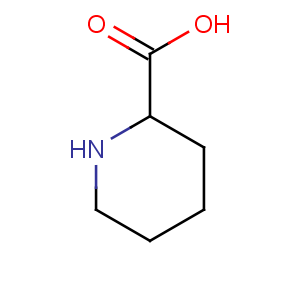Title: Pipecolic Acid
CAS Registry Number: 535-75-1
CAS Name: 2-Piperidinecarboxylic acid
Synonyms: pipecolinic acid; hexahydropicolinic acid; homoproline; dihydrobaikiaine
Molecular Formula: C6H11NO2
Molecular Weight: 129.16
Percent Composition: C 55.79%, H 8.58%, N 10.84%, O 24.77%
Literature References: The
l-form occurs in plants: Phillips,
Chem. Ind. (London) 1953, 127. Prepn: A. Ladenburg,
Ber. 24, 640 (1891); Stevens, Ellman,
J. Biol. Chem. 182, 75 (1950); V. Asher
et al., Tetrahedron Lett. 22, 141 (1981). Synthesis of L-pipecolic acid from L-lysine: Fujii, Miyoshi,
Bull. Chem. Soc. Jpn. 48, 1341 (1975). Synthesis of racemate: R. T. Shuman
et al., J. Org. Chem. 55, 738 (1990).
Derivative Type: l-Form
Properties: Needles by sublimation, mp 270°. [a]D25 -34.9°. Sol in water, dil alcohol. Sparingly sol in abs alcohol, acetone, chloroform. Insol in ether.
Melting point: mp 270°
Optical Rotation: [a]D25 -34.9°
Derivative Type: d-Form
Properties: Platelets from alcohol, mp 270°. [a]D25 +35.7°. Sol in water. Somewhat sol in alcohol.
Melting point: mp 270°
Optical Rotation: [a]D25 +35.7°
Derivative Type: dl-Form
Properties: Leaflets from water, mp 264°. Sol in water, boiling alcohol.
Melting point: mp 264°
Derivative Type: dl-Hydrochloride
Molecular Formula: C6H11NO2.HCl
Molecular Weight: 165.62
Percent Composition: C 43.51%, H 7.30%, N 8.46%, O 19.32%, Cl 21.41%
Properties: Crystals (warts) from alcohol + benzene, mp 258-262°.
Melting point: mp 258-262°

